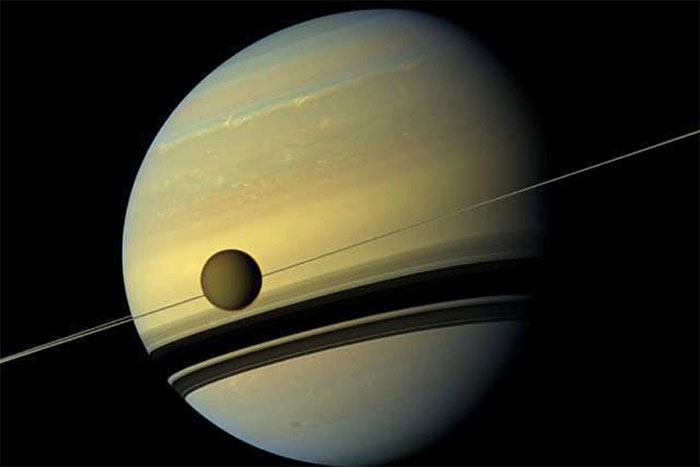New way to study alien life
US scientists have developed a new technique to detect oxygen in the atmosphere of planets other than Earth.
In a study published in the journal Nature Astronomy, scientists at the University of California described the method as detecting strong signals generated when oxygen molecules collide. This signal could help scientists distinguish between life-supporting planets and non-living planets.

On November 19, 2019, scientists published the first geological map on Saturn's Titan satellite, with plains and mounds of frozen organic matter and liquid methane reservoirs. , unravel a new world that is considered a "bright" candidate to study extraterrestrial life.(Artwork: AFP / TTXVN).
Oxygen is used as a guide to life, because it is created by life on Earth when organisms such as plants and algae convert sunlight into chemical energy.
The team suggests that the high concentration of oxygen can be detected from non-living processes by using the Space Telescope James Webb of the US Space Agency (NASA) to capture beginning in 2021. According to the study, when oxygen molecules collide with each other, they block a portion of the infrared light spectrum that a telescope can observe. Thus, by analyzing this in light, scientists can determine the composition of the atmosphere at the planet being observed.
If a planet is very close to its star or receives too much light from that star, its atmosphere becomes much warmer and soaked with water vapor from the evaporating oceans. This amount of water can be broken down by ultra strong ultraviolet radiation into hydrogen and oxygen atoms. Hydrogen is light, so it can easily evaporate, leaving oxygen behind.
Over time, this process can cause entire oceans to disappear completely while creating an atmosphere full of oxygen. Thus, the abundant amount of oxygen in the planet's atmosphere may be necessary for life, but it could also be a sign of a story about the amount of water lost.
According to astronomer Edward Schwieterman of the above group, " it is important to know if dead planets emit oxygen in the atmosphere and how much, so we can realize that one planet can live or not ".
- Stunned new alien life exploration tool
- The golden rule of finding alien life
- Clouds on Venus may contain alien life
- NASA finds 'an alien Earth'
- Hunt for aliens by wavering
- NASA has acknowledged the existence of aliens
- Alien life can be discovered in the next 20 years
- The lake nearly 3 billion years can contain alien life
- Can artificial intelligence predict the probability of alien life?
- Stunned with a new announcement about alien life signs
- Alien life may be right on earth
- Discovering the 'ghost particle' - A strange form of life outside the universe
 'Fine laughs' - Scary and painful torture in ancient times
'Fine laughs' - Scary and painful torture in ancient times The sequence of numbers 142857 of the Egyptian pyramids is known as the strangest number in the world - Why?
The sequence of numbers 142857 of the Egyptian pyramids is known as the strangest number in the world - Why? History of the iron
History of the iron What is alum?
What is alum?